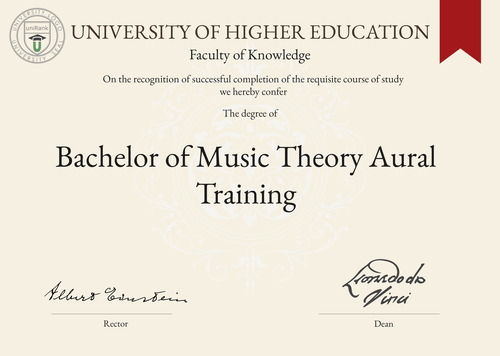
Bachelor of Music Theory Aural Training (BMus (Music Theory Aural Training))
Guide to Bachelor of Music Theory Aural Training Program/Course/Degree
Bachelor of Music Theory Aural Training (BMus (Music Theory Aural Training))

Program Name:
Bachelor of Music Theory Aural TrainingProgram or Degree abbreviation:
BMus (Music Theory Aural Training)Duration range:
Typically 3-4 yearsTuition range:
Varies depending on the country and university, ranging from $5,000 to $40,000 per year.Overview:
The Bachelor of Music Theory Aural Training program is designed to provide students with a comprehensive understanding of music theory and aural skills. It focuses on developing the ability to recognize and analyze musical elements such as melody, harmony, rhythm and form. Students will also gain proficiency in sight-singing, ear training and keyboard skills.Curriculum Overview by year:
- Year 1: Introduction to Music Theory, Aural Skills Fundamentals, Music History Survey - Year 2: Advanced Music Theory, Aural Skills Development, Music Analysis - Year 3: Counterpoint, Orchestration, Music Technology - Year 4: Capstone Project, Elective Courses (e.g., Composition, Conducting)Key Components:
- Music theory analysis and composition - Aural skills development - Sight-singing and ear training - Keyboard proficiency - Music history and analysis - Music technology and productionCareer Prospects:
Graduates of the Bachelor of Music Theory Aural Training program can pursue various career paths, including: - Music theory and aural training instructors - Music composers and arrangers - Music critics and journalists - Music researchers and scholars - Music consultants for film, television and multimedia industriesSalary Expectations:
Salaries for graduates in this field can vary significantly depending on factors such as location, experience and job role. On average, music theory and aural training instructors earn between $30,000 and $60,000 per year, while music composers and arrangers can earn between $40,000 and $100,000 per year. For a more accurate understanding of salary expectations, you can utilize the Job Sites Search Engine, from our sister site jobRank, which searches over 4,600 job sites worldwide. Make sure to specify not only the job title but also the country you are interested in.Conclusions:
It is important to note that the duration, tuition fees, curriculum, key components, career prospects and salary expectations of the Bachelor of Music Theory Aural Training program can vary depending on the country or location where you choose to study, as well as the university you select. To find specific information about this degree program and where it is offered worldwide, you can utilize the uniRank World Universities Search Engine. This will help you explore various options and make an informed decision about pursuing this degree.World Universities Search Engine
search for Bachelor of Music Theory Aural Training (BMus (Music Theory Aural Training)) and add the Location (country, state etc.) or specific University you are interested in studying at.
Query examples:
- Bachelor of Music Theory Aural Training (BMus (Music Theory Aural Training)) United States
- Bachelor of Music Theory Aural Training (BMus (Music Theory Aural Training)) United Kingdom online
- Bachelor of Music Theory Aural Training (BMus (Music Theory Aural Training)) Australia international students
- Bachelor of Music Theory Aural Training (BMus (Music Theory Aural Training)) University of California
- Bachelor of Music Theory Aural Training (BMus (Music Theory Aural Training)) University of London tuition fees
- Bachelor of Music Theory Aural Training (BMus (Music Theory Aural Training)) University of Sydney scholarships
Share Program/Course
Interesting? Share this program/course/degree info with your friends now.